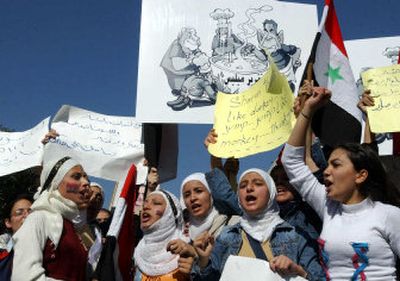Syrians stage mass protest over report

DAMASCUS, Syria – Civil servants and students massed in the streets Monday to protest a U.N. report implicating Syria in the killing of a Lebanese leader, joining in a government-orchestrated campaign to drum up support before a U.N. Security Council meeting.
The United States and Britain were pushing for the council to take a tough stand against Syria at a meeting today, but France said sanctions shouldn’t be voted on until investigators finish looking into the assassination of former Lebanese Prime Minister Rafik Hariri.
At the same time, French diplomats at the United Nations were working with U.S. officials trying to mobilize support for a strong resolution demanding that Syria cooperate fully with the investigation.
“This is true confessions time now for the government of Syria,” U.S. Ambassador John Bolton said. “No more obstruction. No more half measures. We want substantive cooperation and we want it immediately.”
White House spokesman Scott McClellan called the U.N. report “very troubling” and said President Bush had directed Secretary of State Condoleezza Rice to arrange a Security Council meeting at the earliest possible date “to discuss how to proceed.” The U.S. target date for Rice and her counterparts to agree on a resolution is Oct. 31.
Syria’s official SANA news agency said “hundreds of thousands” of people gathered in Damascus and Aleppo to demonstrate against the “unjust accusations” made by the report, released last week by chief U.N. investigator Detlev Mehlis.
The report implicated top Syrian security officials in Hariri’s Feb. 14 assassination, drawing a strenuous denial from President Bashar Assad’s authoritarian regime. Syrian officials called the report politicized, biased and inaccurate.
Lebanon’s major pro-Syrian groups, Amal and Hezbollah, also criticized the U.N. report, saying in a statement Monday in Beirut that a more thorough investigation was needed “based on facts and tangible evidence – not politics.” Their position conflicts with that of Lebanon’s Cabinet, which has endorsed the U.N. report.
The mass demonstrations in Syria were a concerted attempt to drum up support for Assad amid heightening international pressure.
The government gave students a one-day holiday and encouraged civil servants to take part in the rallies, which were organized by state-run labor unions. Police diverted traffic to make way for the protesters.
Syria’s government has long argued that it is being attacked by the West because of its uncompromising stand in the Israeli-Palestinian dispute and Israel’s occupation of Arab land.